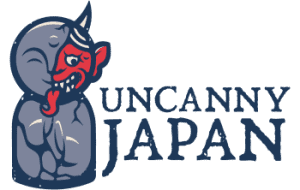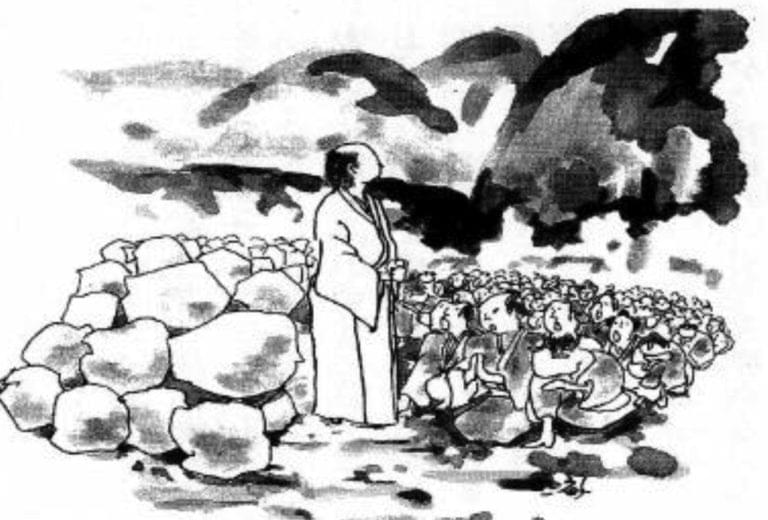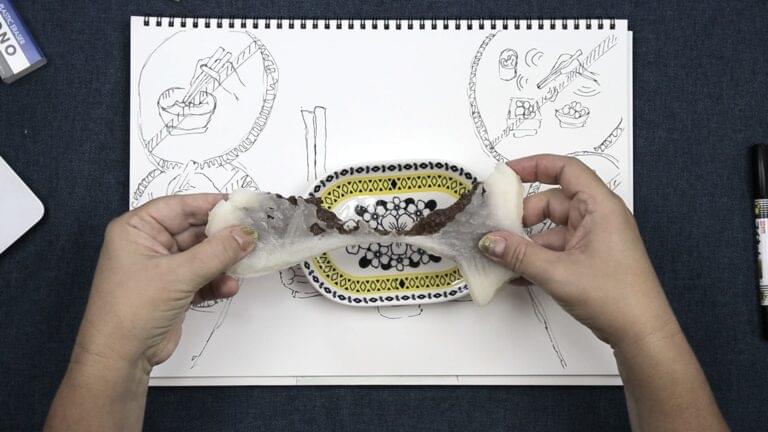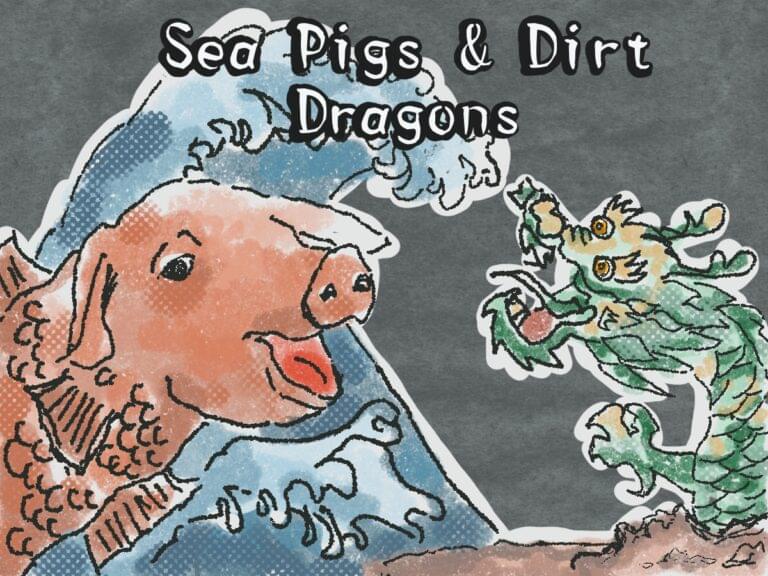Hey hey, this is Thersa Matsuura, author of the book of Japanese folklore and the Coming This Fall 2025 Yōkai Oracle Deck, which you can pre-order if you’d like. I’m here to share with you all those hidden, fascinating, and sometimes frightening corners of old Japan. Come with me as I explore strange superstitions, creepy creatures, and cultural curiosities right here on Uncanny Japan.
What Does “Saiō ga Uma” Mean? Understanding Japan’s Ancient Proverb
Have you ever heard of the proverb “Saiō ga Uma?” In English it’s often called “the old man’s horse” or “the old man on the frontier who lost his horse,” something like that. Well it’s actually a parable that comes originally from China and dates back to the second century. It kind of exemplifies Taoist philosophy, but the fact that it’s still around 2,000 years later tells you it’s an enduring lesson on life. It’s believed to have arrived in Japan when all the other good Chinese knowledge did in the Nara or Heian eras, so from the 700s through the 800s or thereabouts.
It’s very strange, but recently it’s been popping up in my thoughts a lot, just randomly, but again and again, and a couple times I heard it mentioned in an article I was reading or in an audiobook I was listening to, so I thought I’d read about it more. Go ahead and do an episode on it.
You know, I do like to occasionally talk about language and how it relates to culture.
The Complete Story of Saiō and His Horse: A Timeless Parable
There are many different versions of the story of Saiō’s horse that inspired the phrase, but let me tell you mine. I mean, it’s basically the same as all the others, but it goes something like this.
Once upon a time, there was a man named Saiō. He wasn’t especially well-off, but he wasn’t poor either. In fact, he had one horse, a thing to be very proud of. Back then, and to him, that horse meant a lot. It was not only a sign of how hard he’d worked to be able to buy it and to take care of it, but it helped him with farming and was used to get around, not to mention a beloved member of the family. Well, one day that horse got loose and ran away. After they heard the news, all the villagers visited Saiō and offered their condolences. Oh, what an unlucky thing to have happened, Saiō.
What a shame. Poor Saiō. But Saiō didn’t seem very upset about the whole matter.
Instead, he said, “Who’s to say what is good and what is bad? How do you know this isn’t a blessing?”
A few days passed, and out of the blue, his horse returned. But it wasn’t alone.
It brought along another horse, a gorgeous, wild stallion. This new horse was very strong and very fast. Now, he had two horses. The villagers got wind of the news and gathered again in his garden and congratulated him. “Oh, Saiō, what a lucky man you are. What an incredibly fortunate thing to have happened to you.” But Saiō, always cool and collected, answered, “Who’s to say what is good and what is bad? How do you know this is not a disaster?” Not long after that, Saiō’s son decided to try and ride this new steed. He climbed on, but being a wild horse, it did what wild horses do, and promptly bucked him off. The young man was thrown to the ground and broke his leg.
The villagers rushed back to his house, quick to add their commentary on events. “Oh, Saiō, what terrible luck you had. We are so sorry. Such an awful misfortune.” Saiō, not getting sick of them yet, answered, “Who’s to say what’s good and what is bad? How do you know this isn’t a blessing?”
The neighbors probably thought Saiō was a little bit off at this point. How can your son falling from a horse and breaking his leg possibly be any kind of good luck? A little while after that, a terrible war broke out on the border. The Emperor called on all the able-bodied young men to be conscripted and to go and fight. It was a furious battle, and most of the men died.
But because Saiō’s son’s leg was broken, he was spared. The end.
Life Lessons from Ancient Wisdom: When Fortune Becomes Misfortune
So obviously this is a parable about what appears to be misfortune can lead to good fortune, and what appears to be good fortune can lead to bad. That our immediate judgment in labeling something good or bad is usually short-sighted and almost certainly based on incomplete information.
Now hear me out. I think about the stuff I’m seeing on the news. A lot of it is downright heartbreaking and evil, and I spend all day thinking about just how terrible it all is. And I still do. Well, the phrase Saiō ga Uma isn’t about bright-siding any of that, but it is a little multifaceted. I’ve noticed that when everything seems so overwhelming and the world’s burning down around me, I personally find that I can get on a roll and make things worse. A weird kind of confirmation bias, I guess. A real-life example that happened last night, I was cleaning up the kitchen and I put a tin of nice loose-leaf green tea in the fridge. It was late, I was tired, I knocked it, the lid popped open, and green tea went everywhere.
I howled, shut the fridge, and went to bed. Everything is conspiring against me.
This morning though, I’m more “who’s to say what’s good and what’s bad?” I mean, I have to clean it anyway, right? And I realized I also really, really need to deep clean that fridge and have probably needed to for a lot longer than I care to admit. So it’s a perfect opportunity.
All right, that might be a lame example, and as I sit here I haven’t actually cleaned it yet, but you get my drift. So with me at least, these smaller bouts of bad luck, I, if I’m not careful, feel like they further prove that every single thing is so very bad, bad, bad. Which isn’t always the case. Maybe I just need to look a little harder for those sparks of light.
On the other hand, being cynical when something good does happen, I’m also like, “what’s the catch?” So that’s another way of looking at the phrase.
Embracing Humility and Uncertainty: The Buddhist Connection
Then there is that the story of Saiō ga Uma is also about profound humility when faced with the unknown. Ol’ Saiō acknowledges his limits as a mere human, that he doesn’t have perfect understanding or foresight. Humility isn’t passivity. He lost his horse. I don’t know for sure, but I’m guessing he fixed the lock on the barn door. After that, I’d like to imagine he went out and searched for the animal for a while. In my interpretation, I mean he did do something where he could, but he couldn’t go back and change the past. So he learned from whatever happened and then just kind of rested in the not knowing what’s up next. He realized, who is he to label his life events so immediately after they happen? This is good and this is bad. He stays humble, pays attention, learns where he can, and then has a “let’s wait and see” attitude.
There’s a third reason I think this story is resonating with me all of the sudden.
That is, I was in the hospital for a week at the beginning of this year. I can’t remember if I mentioned it here or kept it just for family, friends, and patrons, but long story short, I had what I was quite sure was the start of another deep vein thrombosis. Yes, another. I drove myself to the emergency room, explained what I thought was happening. The doctor very confidently said there was nothing there. I was fine. I pushed back. He pushed back. I pushed back. He pushed back. He sent me home. Two days later Richard is calling an ambulance at 3am because I can’t walk and my leg is swollen and kind of blue, black, terrible looking. Anyway, that happened. I’m better now. But when truly horrible things like that happen, it kind of strips everything away and forces you to re-evaluate your priorities. Kind of dig deeper, find new strengths, maybe. I mean, that’s what we hope to happen, right?
I think for me at least it’s easy to get complacent and fall into routines and habits that probably should be challenged. It might be a stretch, but maybe Saiō ga Uma has a touch of that, too. Hard to say. It was two thousand years ago, and we don’t exactly know how Saiō pondered the loss of his horse or his son’s broken leg. Or even the good things like the appearance of a new horse or his son not having to go to war. But Saiō seems like an introspective sort, doesn’t he?
Finding Inner Peace Through Non-Attachment: Practical Applications
Then finally, and I might be really milking this story, but I have been thinking about it for a while. A fourth thing that the old man’s horse has me mulling over is how it sort of suggests connecting with and making peace with the feeling of uncertainty. Like Saiō, focus on calming down and keeping centered throughout life’s wild unpredictability. Saiō isn’t shattered by a misfortune, and he’s not overly excited and full of himself by some stroke of good luck. It’s been said and preached and taught through the centuries, but by remaining calm, shall we call it inner stillness or non-attachment as the Buddhists do, it’s easier to navigate life’s ups and downs. You have better perspective and make better choices.
Now this isn’t me saying any of this. This is old Saiō, a farmer who lived two thousand years ago, and all the people who passed down his story through the ages.
A longer version of the phrase Saiō ga Uma is Ningen Banji Saiō ga Uma. Everything in life is like Saiō’s horse. If you want to use it in conversation, let’s say your friend gets a parking ticket. You could say something like, Daijōbu Saiō ga Uma desu yo. Don’t worry, it’s like Saiō’s horse. You never know how things will turn out. Or, in the opposite case, let’s say that you won the lottery. You could temper that excitement with, Ureshii kedo Saiō ga Uma to mo yū shi. Yūdanchi nai yō ni shio. I’m really happy, but as they say, Saiō’s horse. I’m not going to be careless. Anyway, Laozi said something similar in the Tao Te Ching. “Misery is what happiness rests upon. Happiness is what misery lurks beneath. Who knows where it ends?” Thank you so much for listening to the show, supporting it, and I’m going to go clean that fridge right now. See what’s lurking behind that big jar of olives.
I’ll talk to you when I’m done, which will probably be in about two weeks. Bye bye.
Thank you so much for listening to Uncanny Japan. If you enjoy learning about these more elusive topics with me, I’d love to invite you into more of my Uncanny world. For exclusive content and monthly bedtime stories read by me, consider joining my Patreon community. Then there are my books. The Book of Japanese Folklore is a small, beautifully illustrated encyclopedia and deep dive into 45 yōkai and mythical figures. My horror short story collection, The Carp-Faced Boy and Other Tales, now has an audio version, also read by me and perfect to fall asleep to. And coming out in November is the Yōkai Oracle deck. 60 yōkai matched with wise Japanese idioms, phrases, and those extremely nuanced words that have no equivalent in English but you’ve always wanted to know how to say. You can pre-order those if you’d like. There’s a clickable thumbnail on the Uncanny Japan website labeled Oracle Cards. Thank you so much for listening. Stay safe and well, and I’ll talk to you again in two weeks.






